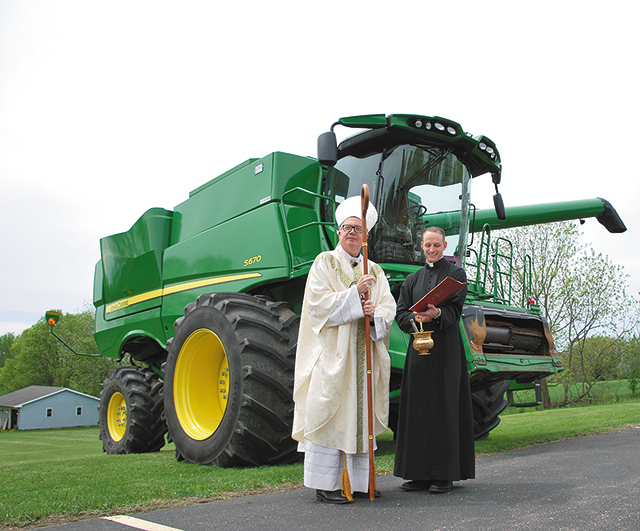
Sunday, May 15, was the feast of Sts. Isidore and his wife Maria, the patrons of farmers and rural life. They lived in Spain near Madrid in the 11th century, and worked as agricultural laborers, their lives marked by a deep Catholic faith, an intense piety, a love for the poor and for nature, as well as a strong work ethic.
Miraculous stories abound of angels finishing his plowing while Isidore prayed in solitude, and of supernatural multiplications of food, which this generous couple shared with the poor.

Their fusion of faith and farming reminds us that farmers embrace a profound vocation of cultivating the world God made, in order to feed all of us.
Reliant on Divine Providence; working in the beauty of nature’s sun; wind, animals, and fields; bringing forth the fruit of the earth for the sustenance of the human race; farmers spiritually participate in God’s creative abundance, living out the stewardship of the earth originally entrusted to Adam.
Farming is spiritual and vocational.
Rural Life Mass
In honor of the occasion, I celebrated a Rural Life Mass this May 15 at St. Augustine Parish in Footville.
Fr. Lawrence Oparajii, the pastor and Fr. Kevin Earlywine, a Dubuque priest who is a son of the parish, concelebrated, joined by parishioners, farmers, and folks from our rural communities.
After Mass, I blessed farm animals, seeds, farm equipment, and all the fields in our diocese, petitioning the Lord for a fruitful growing season and an abundant harvest.
We finished with a lunch in the church hall.
Tim Streiff, the program manager at Catholic Rural Life, joined us, speaking briefly at the end of Mass and offering more information about his work.
His office supports farmers, promotes the Catholic spirituality of farming, and helps pastors of rural communities with formation and resources.
The majority of our beautiful diocese is rural, composed of farms and small towns, a stunning landscape which sometimes obscures the problems and poverty of the people who live and work there.
Many family farms have gone bankrupt, the cost of fuel, seed, and fertilizer has sky-rocketed, and yet the remuneration farmers receive for their hard work and sacrifice is often flat-lined.
Most farmers need to hold second or even third jobs in order to make ends meet. A whole way of family life on the land is in danger of disappearing.
For the past year, Tom Nelson and I have been attending Rural Life Listening Sessions in every one of the 11 diocesan counties, hearing from our people about their experiences, hopes, needs, frustrations, and fears.
The stress that many farmers feel in the current moment contributes to increases in depression, suicide, marital challenges, and poverty.
The faith and farming
One of my hopes for Into the Deep, our recently-launched strategic planning process, is to strengthen the presence of the Church in our rural areas.
By sharing resources, working together on bigger projects, and simply having accurate knowledge of the strengths and challenges of our people, the local Church will be better equipped to respond to needs and offer a more effective pastoral presence to all the rural people who live in our boundaries, not only the Catholics. These outcomes will be the fruit of our listening sessions.
At Mass, I am often aware how much the world of nature is incorporated into the liturgy.
We consecrate the fruits of the earth — the bread and the wine. We use olive oil in many of the sacraments. Beeswax candles and fragrant incense, the color and texture of the fabric in the liturgical vestments, the interplay of light and darkness all connect the elements of the world which God created to our worship of Him.
Many of the Scriptural images Jesus used in the parables are taken from the agricultural experience of His listeners. The parable of the sower, the mustard seed, the Good Shepherd, the weeds among the wheat, the treasure in the field, the vine and the branches, all utilize the very familiar elements of the world to speak of the mysteries of the Kingdom of God.
We pray for and support our farmers, asking for good weather and abundant harvests.
All of us, regardless of where we live, are stewards of the earth, called to care for God’s creation, to utilize resources wisely and generously, and to cultivate the hearts and souls of our brothers and sisters, as well as our own, through prayer, service, and charity.
The work we embrace each day becomes a part of our worship of the Lord and our way to sanctify the world, as we seek to do our part, make our contribution to the building of the Kingdom of God.

